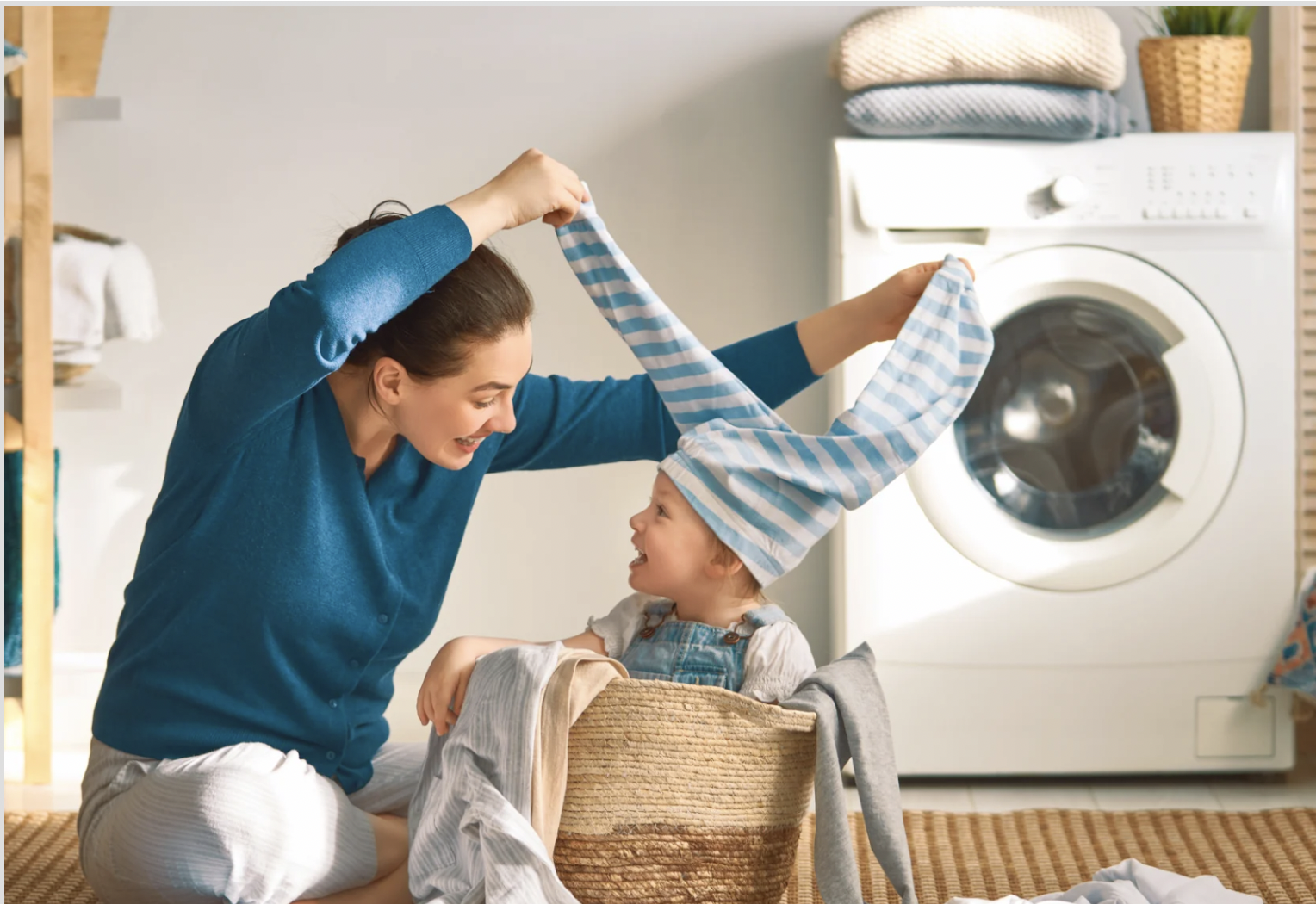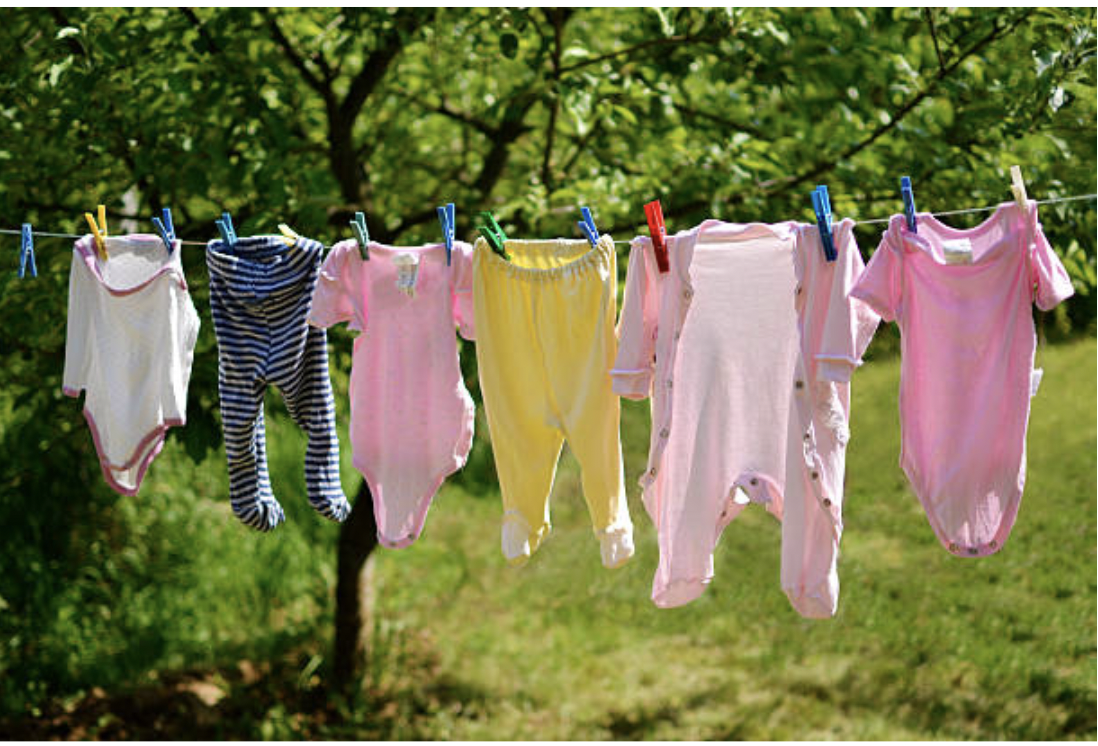Sustainable Laundry Practices for New Parents: Safe Solutions for Baby Clothes

The task of washing a baby's clothes brings a set of challenges, especially for new parents, as it's not just about cleanliness, it's about ensuring it's safe for both the baby and the environment.
If you’re looking to adopt sustainable laundry practices for baby clothes, here’s a straightforward guide to more eco-friendly solutions.
Choosing Sustainable, Eco-Friendly Fabrics
When you're picking out clothes for your little one, it's important to zero in on natural and organic fabrics like organic cotton, bamboo, and hemp.
These materials aren't just soft and comfortable, they're also safe for your baby's sensitive skin because they're grown without harsh pesticides or harmful chemicals.
Plus, they're biodegradable, which means they're kinder to our planet.
Did you know organic cotton is also more sustainable? It requires less water and energy to produce than its non-organic counterpart.
Environmentally Friendly Minimalist Wardrobe
Instead of buying loads of cute outfits, choose a few high-quality, versatile pieces. This reduces the amount of laundry, saving you time and energy.
Go for gender-neutral options that can be shared among siblings, promoting reuse.
For diapers, cloth diapers are a fantastic, eco-friendly alternative to disposable ones. If they're not for you, that's okay. Consider environmentally friendly disposable brands.
Even small switches, like choosing wooden clothespins over plastic ones, contribute to a more sustainable lifestyle.
Pre-Washing New Baby Clothes
Every single new item of baby clothing you buy should be washed before your little one wears it for the first time. This is crucial to ensure any potential irritants are removed.
Here's a quick guide to pre-washing baby clothes:
- Use a gentle, non toxic laundry detergent. Harsh chemicals aren't just bad for the environment, they're also harmful for your baby's delicate skin.
- Wash on a cool, gentle cycle. This can help maintain the quality of the clothes while using less energy.
- Dry naturally when possible. Not only does this save energy, but it can also preserve the life of the clothes.
The Benefits of Natural Laundry Detergent
Switching to natural detergent is a small but impactful step towards a sustainable lifestyle. Additionally, these plant-based cleaners are free from harmful chemicals often found in traditional detergents, reducing the risk of skin irritation and allergies.
Here are some of the key benefits:
- Natural detergents are free from harsh chemicals, making them perfect for your baby's delicate skin.
- They are biodegradable and have less impact on our waterways, supporting a healthier planet.
- Despite being mild, they effectively remove stains and odors, ensuring your baby's clothes are always clean and fresh.
Selecting Green Detergents
Not all detergents are created equal, especially when it comes to the environment and your baby's health.
Opt for green detergents, which are made from plant-based ingredients and are biodegradable. They should be free of harsh chemicals, artificial fragrances, and dyes that could irritate your little one's sensitive skin.
Look for labels that indicate 'eco-friendly', 'plant-based', or 'biodegradable'. Brands like Clean People are leading the way with eco-friendly laundry sheets made in the USA — offering an ultra-gentle yet powerful clean that’s perfect for baby clothes while cutting down on plastic waste and harsh residues.
Conserving Energy With Cold Washes
To make laundry practices more sustainable, you should consider the energy consumption involved. A key way to reduce this is by washing baby clothes in cold water. Not only does this save energy, but it also helps maintain the durability and color of your baby's clothes.
Let's break it down:
- Energy Efficiency: Most washing machines use the majority of their energy heating water. By using cold water, you're significantly reducing your energy consumption.
- Clothes Longevity: Cold water is gentler on clothes, helping them retain their color and structure for longer.
- Cost-Effective: Using cold water can also save you money on your energy bills over time.
Effective Stain Removal Techniques
Dealing with stubborn stains on your baby's clothes can seem daunting, but effective stain-removal techniques can make it a breeze.
As soon as a stain happens, tackle it. Rinse or soak the garment in cold water, as hot water can set certain types of stains.
For tougher stains, like those from baby food or diaper cream, pre-treat with a stain remover. Always check the care label on the clothing for any specific instructions.
Avoid using bleach or harsh chemicals, as they can be harmful to your baby's sensitive skin and the environment. Instead, opt for eco-friendly stain removers. They're not just safe, but also effective.
Air-Drying: An Eco-Friendly Alternative
Another smart way to conserve energy and protect your baby's clothes is by air-drying them instead of using a dryer.
Unlike machine drying, which can shrink and deteriorate the fabric, air-drying maintains the quality and longevity of your baby's outfits. Plus, it's completely free and reduces your carbon footprint.
Consider using a clothesline or a drying rack. If you've got some sunlight, let it work its magic. It's a natural disinfectant and can even help to fade stains.
If outdoor space is an issue, indoor drying racks work just as well. Remember to turn the clothes occasionally to allow even drying.
It's a simple step, but air-drying your baby's clothes is an eco-friendly action that benefits both the planet and your little one's wardrobe.
Safe Baby Clothes Washing Practices
Here’s a few tips to keep in mind:
- Avoid cross-contamination by washing your baby's clothes separately from your own.
- Consider adding a quarter cup of vinegar to the wash cycle to kill germs naturally without harsh chemicals.
- Always wash your hands before and after handling your baby's laundry.
Frequency of Washing Baby Clothes
With babies, outfit changes come frequently due to spit-ups, diaper leaks, or outdoor play. On average, most parents wash baby clothes every other day, especially for items worn frequently.
Infrequently worn items can be washed once a week. However, this may vary depending on your baby's activities and mess levels.
Importantly, always wash new clothes before your baby wears them to remove any harmful chemicals. Therefore, prepare for more laundry rounds than usual.
Conclusion
Adopting sustainable laundry practices for your baby's clothes is an effective way to balance the health of your child and the well-being of our planet.
Choosing eco-friendly fabrics, washing new clothes before use, using natural detergents, incorporating energy-efficient washing, and choosing to air-dry – these are all steps you, as a new parent, can take for a greener future.
Even these small steps can make a big impact over time, steering us towards a more environmentally friendly and health-conscious lifestyle for the coming generations.







